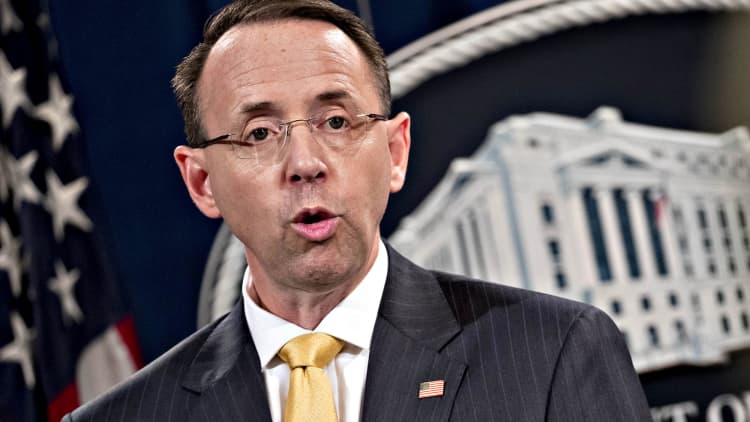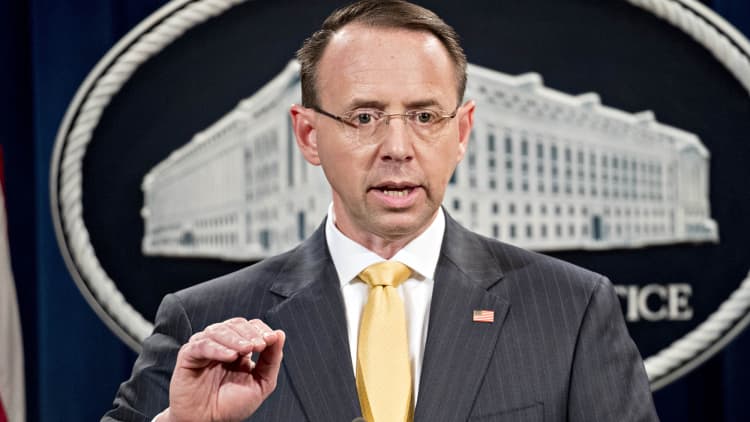
Special counsel Robert Mueller on Friday released a surprise indictment of 13 Russian individuals and three Russian entities alleged to have sown discord through "information warfare" in then-candidate Donald Trump's favor during the 2016 presidential election.
The 37-page document outlines specific ways in which Russia, through numerous individuals and organizations, sought to influence the election — from abroad, online and on U.S. soil.
Here are some of the most important quotes:
- The so-called Internet Research Agency, a Russian corporate entity registered in July 2013, "sought, in part, to conduct what it called 'information warfare against the United States of America' through fictitious U.S. personas on social media platforms and other Internet-based media.'"
- The Internet Research Agency "focused on the U.S. population and conducted operations on social media platforms such as YouTube, Facebook, Instagram and Twitter."
- "By in or around May 2014, the organization's strategy included interfering with the 2016 U.S. presidential election, with the stated goal of 'spread[ing] distrust towards the candidates and the political system in general.'"
- The Russian entity "had a strategic goal to sow discord in the U.S. political system, including the 2016 U.S. presidential election. Defendants posted derogatory information about a number of candidates, and by early to mid-2016, Defendants' operations included supporting the presidential campaign of then-candidate Donald J. Trump ('Trump Campaign') and disparaging Hillary Clinton."
- The defendants sought disruption by staging events for and against Trump after the election: "After the election of Donald Trump in or around November 2016, Defendants and their co-conspirators used false U.S. personas to organize and coordinate U.S. political rallies in support of then president-elect Trump, while simultaneously using other false U.S. personas to organize and coordinate U.S. political rallies protesting the results of the 2016 U.S. presidential election."
- It goes on: "For example, in or around November 2016, Defendants and their co-conspirators organized a rally in New York through one organization-controlled group designed to 'show your support for President-Elect Donald Trump' held on or about November 12, 2016. At the same time, Defendants and their co-conspirators, through another organization-controlled group, organized a rally in New York called 'Trump is NOT my President' held on or about November 12, 2016. Similarly, Defendants and their co-conspirators organized a rally entitled 'Charlotte Against Trump' in Charlotte, North Carolina, held on or about November 19, 2016."
- The defendants attempted to discourage African-American turnout in the election: "In or around the latter half of 2016, Defendants and their co-conspirators, through their organization-controlled personas, began to encourage U.S. minority groups not to vote in the 2016 U.S. presidential election or to vote for a third-party U.S. presidential candidate."
- The entity allegedly used an account on Instagram called "Woke Blacks" to post: "'[A] particular hype and hatred for Trump is misleading the people and forcing Blacks to vote Killary. We cannot resort to the lesser of two devils. Then we'd surely be better off without voting AT ALL.'"
- The defendants allegedly stole Americans' identities to open online payment accounts — an allegation appearing to connect the Russians with the actions of Richard Pinedo, who was also indicted separately by the special counsel on Friday. "Defendants and their co-conspirators also used, without lawful authority, the social security numbers, home addresses, and birth dates of real U.S. persons to open accounts at PayPal, a digital payments company...[they] purchased credit card and bank account numbers from online sellers for the unlawful purpose of evading security measures at PayPal..."
- They also allegedly used cryptocurrency exchanges to maintain their accounts: "Additionally, and in order to maintain their accounts at PayPal and elsewhere, including online cryptocurrency exchanges, Defendants and their co-conspirators purchased and obtained false identification documents, including fake U.S. driver's licenses."
- The indictment describes Trump campaign officials who communicated with the Russians as "unwitting" in the defendants' plans: "Some defendants, posing as U.S. persons and without revealing their Russian association, communicated with unwitting individuals associated with the Trump Campaign and with other political activists to seek to coordinate political activities."
WATCH: What's concerning about Russian indictments



